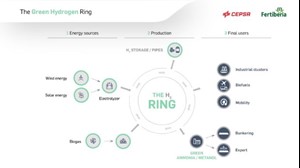News
Cepsa and Fertiberia form alliance to boost green hydrogen production and decarbonize industry in Huelva
Cepsa and Fertiberia, two of Spain's largest H2 consumers, have reached an agreement to decarbonize their production processes by jointly developing a large-scale renewable H2 plant in Huelva using green energy and other renewable gases. The companies will also implement other industrial synergies between their Huelva sites.
Through this union, Cepsa and Fertiberia have become strategic partners in the project to develop 1 GW of electrolysis capacity in Palos de la Frontera as part of the Andalusian Green Hydrogen Valley. This valley will have a 2-GW capacity—1 GW in Campo de Gibraltar (Cádiz) and another in Palos de la Frontera (Huelva)—and production of up to 300,000 tons in Cepsa's Energy Parks.
The agreement will meet the H2 and biogenic CO2 needs of both companies’ facilities in the industrial fabric of Palos de la Frontera (Huelva) in the most optimal way. Green H2 production will begin in 2026, and it will be used for Cepsa's and Fertiberia's own industrial consumption while enabling the manufacture of advanced biofuels, ammonia, AdBlue and sustainable crop nutrition solutions.
Cepsa's La Rábida Energy Park is adjacent to Fertiberia's facilities in Palos de la Frontera. Therefore, the partnership will help to leverage all existing industrial and operational synergies between the two sites, allowing them to be managed as efficiently as possible.
The alliance will allow a circular H2 and oxygen economy to be developed in Huelva. The construction of this infrastructure will be a pioneering engineering project, connecting H2 producers with consumers to ensure a more sustainable, efficient and competitive energy supply. It will take advantage of synergies between all nearby industries while guaranteeing their secure supply.
Upon signing this agreement, Maarten Wetselaar, CEO of Cepsa, said, "We are adding a new strategic partner to the Andalusian Green Hydrogen Valley to continue promoting the decarbonization of industry in Huelva and make it a benchmark for sustainability in Europe. Our agreement with Fertiberia is a major step forward in our commitment to green H2 as a key energy vector to decarbonize our own activity and that of our customers."
According to Javier Goñi, CEO of Grupo Fertiberia, "Our alliance with Cepsa is significant, as it implies a collaboration between the two companies with the longest industrial tradition in the province of Huelva and which account for nearly all the H2 consumption in Andalusia today. This alliance will make Huelva's green H2 production more competitive, becoming a source of opportunities for multiple companies along the value chain. It will also further the full decarbonization of our assets and our positioning as a leader in green ammonia and sustainable crop nutrition solutions."
The H2 Roadmap, established by the Spanish government, sets a target for 25% of H2 consumption in industry to be renewable by 2030, both as a raw material and as an energy source. Through this agreement, Cepsa and Fertiberia will decarbonize their consumption by using green H2, jointly meeting the target set for the whole of Spain by the end of the decade.
As a part of their agreement, the two companies will also consider producing renewable fuels (green methanol and ammonia) in both Huelva and other provinces in mainland Spain.


